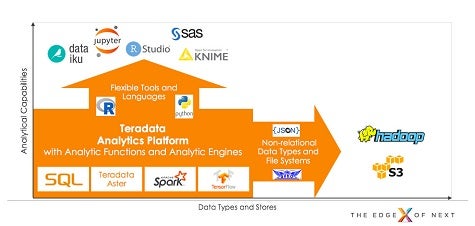A fierce debate has raged for some time now over the future of the data warehouse. Proponents of various Big Data platforms have contended that data warehouses based on relational databases are effectively obsolete. And yet, regardless of the platform employed, SQL remains the dominant query language. Teradata this week moved to render this debate moot with the launch of the Teradata Analytics Platform, which promises to enable IT organizations to employ multiple types of data engines within a common platform.
Announced at the Teradata Partners Conference, Imad Birouty, director of product marketing for Teradata, says the Teradata Analytics Platform will enable IT organizations to plug Spark, TensorFlow, Gluon and Theano data engines to query Big Data and access a full range of machine and deep learning algorithms. On the front end, Birouty says Teradata Analytics Platform will be able to support not only SQL, but also R, Python and SAS-based programming tools such as Jupyter, RStudio, KNIME, SAS and Dataiku.
Birouty says IT organizations will be able to mix and match engines using query grid architecture that will allow multiple engines to be plugged into a re-engineered Teradata platform that now combines the company’s traditional SQL engine with the symmetrical multiprocessing engine that Teradata gained when it acquired Aster Data Systems in 2011. The core Teradata Analytics platform will be made available via an early access program later this year, with various add-on data engines being made available across 2018. The result will not only be broader access to advanced analytics, but also a significant reduction in cost as IT organizations move to consolidate backend data engines that today run on dedicated infrastructure, says Birouty.
“We’re moving to both operationalize analytics as well as democratize analytics,” says Birouty.
As part of that effort, Teradata this week also announced a Teradata IntelliSphere, a subscription-based licensing program through which organizations that commit to using three or more of 10 Teradata tools will receive a significant reduction in software licensing fees.
As a leading provider of data warehouses, Teradata has been a staunch support of the value of relational databases and SQL. Going forward, it’s now clear that Teradata intends to pursue a more polyglot approach to analytics and data management spanning multiple engines capable of sharing a common base of infrastructure.



